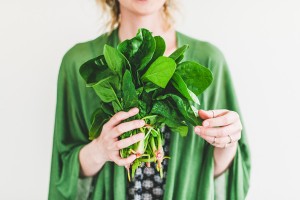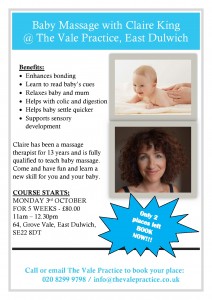Eat yourself young: Nutritionist’s top advice on using diet to tackle menopause
There’s a hilarious scene in Sensitive Skin, a 2005 BBC comedy-drama, in which Davina Jackson, played by Joanna Lumley, asks her GP for a repeat prescription of HRT (Hormone Replacement Therapy).
She’s 61 and, it transpires, has been taking HRT for 10 years. As such, her GP takes the opportunity to point out the danger of continuing treatment at her age, with an exhaustive, worst case scenario list of the many risk factors, including breast, ovarian and womb cancer.
“But on the plus side…?” asks Davina.
“It keeps you looking younger,” answers the doctor.
“Well, you know, why rock the boat?” comes her blithe reply.
Nutritionist and women’s health expert Dr Marilyn Glenville has come across countless women who feel the very same way.
“For me, the menopause is a natural transition,” she explains. “But for some women, if the symptoms are strong or they just can’t deal with them, they will go down the HRT route,” she says.
“At some point they have to come off it, though. Some women are fine – but for other women, the symptoms can be worse than when they went on it in the first place. It’s almost like withdrawal symptoms.”
Glenville is one of the UK’s best-known nutritionists, and the former president of the Food and Health Forum at the Royal Society of Medicine. She has also written a number of best-selling books, including Natural Solutions to the Menopause and Healthy Eating for the Menopause, but is perhaps best known on these shores for advocating a natural approach to enhancing fertility.
Her approach to ageing and the menopause is much the same. She believes that diet and simple lifestyle changes can be a reliable alternative to HRT and bio-identical hormone therapy; and while she thinks HRT should be used for medical reasons – “say a woman goes through a premature menopause at the age of 20” – she doesn’t consider the menopause to be a medical concern from the age of 50 onwards.
“For me, we are still replacing hormones that shouldn’t be there,” she explains. “We are saying that nature has got this wrong – that the hormones shouldn’t be declining – so we’re going to replace them. We are going against what’s naturally happening in our bodies.
“And then when do you stop? Are you going to take it until you’re 80? That’s the tricky bit.”
According to Glenville, menopausal symptoms can be alleviated – or avoided altogether – with forward planning and a consistent dietary and fitness regime.
Indeed, she remembers one patient coming into her clinic and saying, “I haven’t had a period in six months. When are the symptoms going to start?”
“If we prepared for this a little earlier,” she continues, “then all that would happen is the cycle would stop and we would just sail through this transition, because that’s all it is – a transition.”
Tweaking the diet is the first step.
Glenville tells her perimenopausal and menopausal patients to add phytoestrogens – hormone-like compounds found in certain plants – to their diets as soon as possible.
“Years ago, scientists discovered groups of women around the world who don’t get hot flushes and night sweats in the same way that we do,” she explains.
“They found that women in Japan, China and the Middle East have easier menopauses because they use a lot of legumes like lentils, chickpeas and soya beans in their cuisine.
“It’s so easy to add these foods to your daily diet,” she continues.
“Just add flaxseeds to your porridge and eat snacks like hummus or lentil soup.”
Stabilising the blood sugar is also crucial. “It makes the biggest difference as women are no longer on this rollercoaster of ups and downs that affects their energy and moods.” Stable blood sugar also promotes an uninterrupted night’s sleep.
Eating little and often while reducing the amount of sugar and refined foods in the diet will help get blood sugar under control. It also reduces the toll on the adrenal glands, which is where stress hormones such as cortisol are produced.
During the menopause, the adrenal glands also begin to produce oestrogen to compensate for the ovaries producing less of the hormone.
“Therefore it’s important that we’re not stressed and producing excess cortisol going through the menopause. In that case, the adrenal glands are not compensating for the drop in oestrogen from the ovaries, and the cortisol actually increases the menopausal symptoms.
“For instance, if a woman is running late for an appointment, she’ll get anxious and a hot flush will come over her.”
Certain foods can also trigger hot flushes – think spicy foods, caffeinated drinks and alcohol. “Be careful with alcohol,” adds Glenville. “It has to be dealt with by the liver and the liver also has to detoxify and eliminate hormones so we have to be a bit careful around this stage of life. A glass or two here and there is okay but we need a few days off in the week.”
Menopausal women should also have a good intake of omega-3 essential fatty acids from oily fish, nuts and seeds. Omega-3 helps normalise hormone levels and lubricate the skin, hair, joints and vagina. Incidentally, the symptoms of omega-3 deficiency – dry skin, fatigue, difficulty losing weight – can often be mistaken for menopausal symptoms.
These dietary additions should be complemented by a good multivitamin “with a focus on bone health”.
One in two Irish women over the age of 50 will develop a fracture due to osteoporosis in their lifetime, so bone health becomes more important than ever during the menopausal years and beyond, when low levels of oestrogen exacerbates bone loss.
“Osteoporosis is a huge problem but it is preventable,” explains Glenville. “It’s one of these silent diseases in that there can be no symptoms.
“The only time there’s a diagnosis is because the woman has sneezed and cracked her rib or she’s knocked her wrist on the table. That brittleness and fragility is going on quietly inside and the fracture becomes the diagnosis.”
She recommends that women over the age of 50 go for a bone density scan (DXA) and take a multivitamin containing the ‘big three’ for bone health: calcium, vitamin D and magnesium.
Magnesium – otherwise known as ‘nature’s tranquiliser’ – is also helpful for balancing the mood swings that tend to be more pronounced during perimenopause. The B vitamins – in particular vitamin B6 – also regulate mood, while chromium (which should be in your multivitamin) is helpful for stabilising blood sugar.
According to Glenville, we’ve come a long way since the days when women “were given tranquillisers and Valium and nobody really talked about [the menopause].”
She adds that women today are much more likely to embrace this chapter of their life, and quotes anthropologist Margaret Mead, who famously said, ‘There is no more creative force in the world than the menopausal woman’.
“When we look at traditional cultures around the world, menopausal women become ‘wise women’,” she continues. “They have a different status. They are held in high esteem. They counsel younger couples. It’s a different position in society rather than feeling invisible like women tell me in the west.
“We can’t stop the clock but we’re aiming to slow it down and give women the energy to do what they want when they have the freedom to do it. Taking responsibility for diet, stress management and exercise can take a bit of effort in the beginning, but the long-term benefits are enormous.”
* Marilyn Glenville will be delivering a talk entitled ‘Natural Solutions to the Menopause and Prevention of Osteoporosis’ at the Wexford Talbot Hotel on Wednesday, from 7pm to 9.30pm. Tickets, €10, can be purchased at the Natural Health Store, Main Street, Wexford
The 50+ female shopping basket
• Chickpeas
• Dark green leafy vegetables
• Dairy products (cheese in moderation)
• Flaxseed
• Hummus
• Lean cuts of meat (in moderation)
• Linseeds (easily mixed into foods)
• Nuts and seeds
• Peas
• Oily fish (sardines, mackerel, salmon)

BABY MASSAGE COURSE

COURSE STARTS:
MONDAY 3rd OCTOBER, FOR 5 WEEKS – £80.00
11am – 12.30pm
64, Grove Vale, East Dulwich,
SE22 8DT
You will also learn about what oils to use, how to create a suitable environment, follow your baby’s cues, massage safely and adapt the massage as your baby grows. Handouts and organic sunflower oil is provided. Parents need to bring a towel and a blanket.
Baby massage classes are friendly, sociable and accepting – babies aged 6 weeks to crawling are welcome exactly as they are! If your baby was premature, or has any other special requirements, please contact the instructor first to let them know.
**All you need to bring is yourself and your baby, (baby must be over 6 weeks) & a towel and blanket **
**Please note plenty of space for buggies in reception, we also have changing facilities**
To book a place on the course please call 020 8299 9798 or
e-mail info@thevalepractice.co.uk
